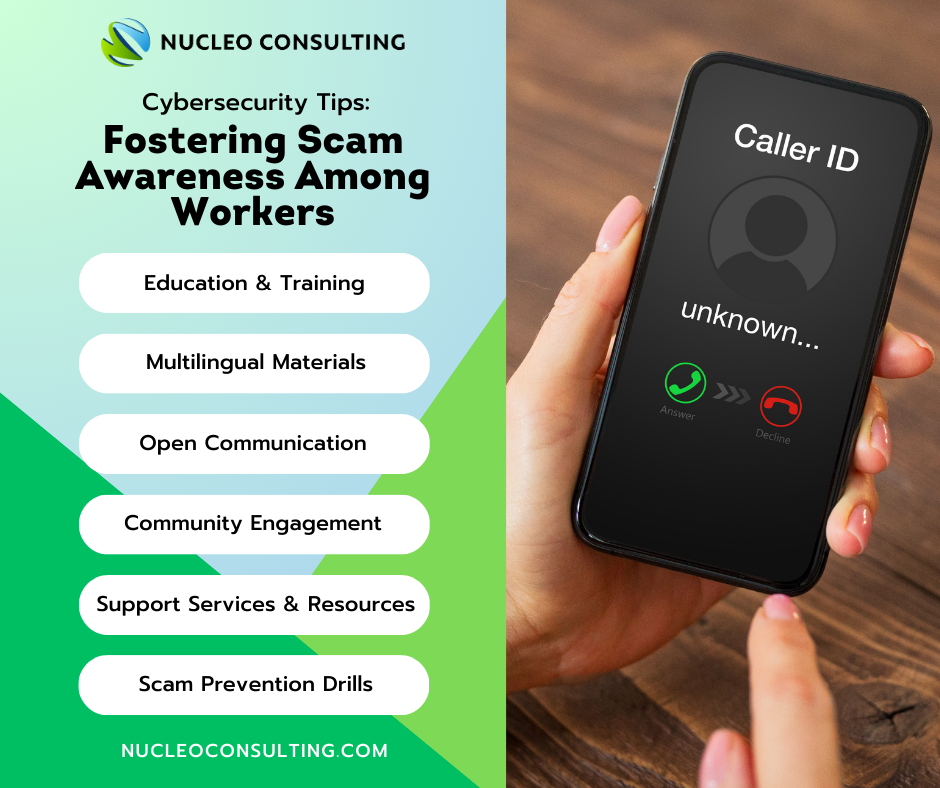Securing The Workforce: Fostering Scam Awareness Among Workers
[3 mins read]
As scam levels continue to rise, affecting not only businesses but vulnerable individuals such as migrant workers, it becomes critical for businesses to step up their efforts in scam prevention.
As shared in a recent report, about 3,500 migrant workers lost more than S$25 million to scams in the year 2022. In recent years, Singapore has witnessed a concerning rise in fraudulent activities, with phishing scams, job scams, loans, and love scams identified as the most common types of scams.
In this article, we explore the ways businesses can contribute to scam prevention and protection, ensuring the safety and well-being of their employees and the broader community.

Education and Training
Cybersecurity is a shared responsibility. It is recommended that all businesses should take proactive steps to provide education and training initiatives to equip their employees with the knowledge and tools needed to identify and prevent scams. These initiatives should cover a wide range of scams, including those targeting migrant workers specifically. Regular workshops or webinars led by experts or in collaboration with Non-Governmental Organizations (NGOs) can provide valuable insights into scam tactics, warning signs, and prevention strategies. Business owners may also make use of free resources online, such as relatable videos or posters to spread awareness of scam prevention.
Multilingual Materials
Since migrant workers come from different language backgrounds, businesses are recommended to run their campaigns in multiple languages to raise awareness. Materials, videos, and workshops in their native language may be more appealing to employees, even those with limited language skills to understand the risks and how to prevent scams.
Open Communication
Creating an open and non-judgmental communication environment is essential for scam prevention. Businesses should encourage employees, including migrant workers, to report any suspicious incidents without fear of repercussions. Providing anonymous reporting channels may further facilitate the reporting of potential scams, thereby enabling timely actions.
Community Engagement
Beyond their immediate workforce, businesses can foster community engagement and integration efforts. This involves collaborating with local organizations and community groups to strengthen the support network for vulnerable populations, such as migrant workers. Engaging in community outreach programs can help bridge gaps, build trust, and empower individuals with the necessary knowledge to stay vigilant against scams.
Support Services and Resources
Businesses should ensure that all employees, especially migrant workers, have access to support services and resources, such as dedicated hotlines, legal aid, counseling services, and information on relevant government agencies. By providing assistance, businesses play an important role in empowering their workforce to seek help when faced with scam-related challenges.
Scam Prevention Drills
Businesses may consider conducting scam prevention drills within the workplace to enhance employees’ preparedness to tackle real-life situations. These exercises should simulate potential scams, enabling employees to practice their responses and reinforcing the information gained through training initiatives.
Scam prevention requires continuous efforts from all sectors of society, including businesses. By prioritizing education, training, and multilingual awareness campaigns, businesses can empower their employees, particularly vulnerable migrant workers, to protect themselves against scams effectively. Additionally, fostering open communication, community engagement, and providing access to support services further strengthens the collective defense against cyber threats and frauds. With this united effort, businesses not only protect their employees but also contribute to a resilient and secure society that thrives in the face of evolving cybersecurity challenges.
IT Tips | Scams | Cybersecurity | Cyber Threats | Cybersecurity Awareness | Cyber Safety | Scam Prevention | Scam Alert
